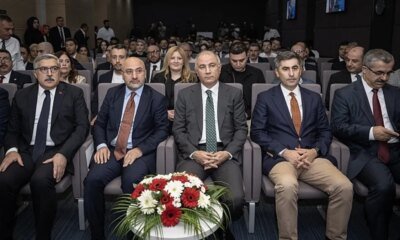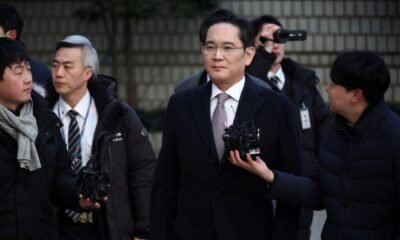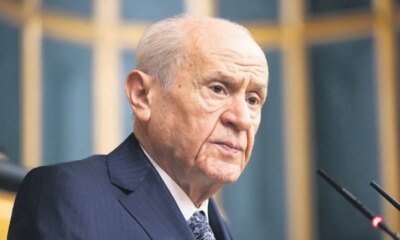Economy
Türkiye, S. Korea agree to deepen defense, nuclear, green energy co-op
Türkiye and South Korea have agreed to enhance cooperation in the defense industry, nuclear energy and green energy sectors, statements said on Thursday following a phone call between the two countries’ leaders.
During the call, President Recep Tayyip Erdoğan and South Korean President Lee Jae-myung discussed bilateral relations, as well as regional and global issues, and addressed expanding bilateral collaboration in strategic sectors.
The two sides had reached a consensus on strengthening ties in defense, nuclear power and green technologies, statements from the two countries said.
It’s the two leaders’ first call since Lee was elected as South Korea’s new president last month.
Erdoğan underlined the potential for cooperation in many areas, including nuclear energy, artificial intelligence, green energy and the defense industry, the statement said.
He also extended an invitation to Lee to visit Türkiye.
South Korea is among the countries bidding to construct Türkiye’s planned second nuclear power plant in the northern province of Sinop.
The project is seen as a key component of Türkiye’s energy diversification and decarbonization strategy.
Economy
House sales in Türkiye jump again in June as demand persists
House sales in Türkiye remained robust in June as over 107,000 units were sold nationwide, official data showed on Thursday, reflecting strong demand that comes despite a prolonged period of elevated borrowing costs.
A total of 107,723 homes were sold across the country last month, up 35.8% year-over-year, according to the data from the Turkish Statistical Institute (TurkStat).
The country’s largest and most populous city, Istanbul, once again led the market with 17,656 units sold in June, data revealed.
The capital Ankara followed with 9,428 sales, while the Aegean city of Izmir recorded 5,987 sales. The provinces with least sales were Ardahan with 38, Bayburt with 62 and Hakkari with 81 units, TurkStat said.
New home sales climbed 32% year-on-year to 33,569 units in June, while second-hand sales jumped 37.6% to 74,154 units.
Mortgage-financed sales, meanwhile, surged 112.6% in June compared to a year earlier, totaling 14,484 homes and representing 13.4% of all house sales.
Sales to foreign buyers also rose, with 1,565 homes sold to non-Turkish citizens – an 8.7% increase from last year. Russians, Ukrainians and Iranians accounted for the highest number of foreign purchases.
The provinces with the highest number of house sales to foreigners were the Mediterranean resort of Antalya with 603, Istanbul with 521 and Mersin, also in the south of Türkiye, with 128 units sold last month.
While home sales to foreigners rose slightly in May and June, in the January-June period, cumulative sales to foreigners decreased by 10.6% compared to the same period of the previous year to 9,354 units, the data revealed.
The Turkish housing market has shown resilience and has seen a continued period of strong monthly sales despite tight monetary conditions. The Turkish central bank has kept its key policy rate at 46% after reversing a short-lived easing cycle, as it aims to curb inflation, which has shown to be particularly sticky in the services sector and rents.
Sales in first half of year up 26.9%
TurkStat data also revealed that total house sales, from January through the end of June, reached some 691,893 units, marking a 26.9% increase over the same period in 2024.
Of this, mortgaged sales totaled 103,090 units, which marked an increase of 100.5% compared to the same period last year.
Separate data released by the Turkish central bank on Thursday also showed that the residential property price index (RPPI) ticked up 2% on a monthly basis in June.
The RPPI increased annually by 32.8% in nominal terms and decreased by 1.7% in real terms, the data from the bank revealed.
The regions that saw the highest rise in annual terms were mostly the eastern and southeastern provinces of Erzurum, Erzincan, Bayburt, Ağrı, Ardahan, Kars, Iğdır, Bingöl, Elazığ, Malatya, Tunceli, Van, Bitlis, Hakkari, Muş, alongside the capital Ankara.
At the same time, southwestern and southern provinces such as Aydın, Denizli, Muğla, Antalya, Burdur and Isparta saw the lowest annual change, the Central Bank of the Republic of Türkiye (CBRT) said.
Economy
Study reveals persistent pay gap for immigrants in major economies
Immigrants in Germany, the United States, France and six other countries earn significantly less on average than native-born citizens, research published on Thursday showed.
Other countries include Canada, Denmark, the Netherlands, Norway, Spain and Sweden, according to an international study commissioned by the journal Nature and conducted with the participation of researchers from the Nuremberg Institute for Employment Research (IAB).
Several of the other countries are closing the wage gap in the second generation of immigrants more quickly than Germany.
In Germany, the income gap for the first generation is 19.6%. The main reason for the deficit is not unequal pay for the same work, but rather limited access to better-paid industries, occupations and companies.
Data from 13.5 million immigrants and native workers in nine countries was analyzed for the study.
“Integration is primarily about breaking down structural barriers to access well-paid jobs,” said Malte Reichelt, co-author of the study, from the IAB.
Language support, recognition of foreign qualifications, expansion of professional networks and better information transfer are important for breaking down structural barriers.
In Germany, there is still a wage gap among second-generation immigrants, averaging 7.7%. Descendants of immigrants from Africa and the Middle East, in particular, continue to be disadvantaged.
An international comparison reveals varying degrees of disparity.
The largest wage gaps among the first generation were found in Spain (29.3%) and Canada (27.5%), followed by Norway (20.3%), Germany (19.6%), France (18.9%) and the Netherlands (15.4%).
The differences were significantly smaller in the U.S. (10.6%), Denmark (9.2%) and Sweden (7%).
Income differences are also evident among the second generation, with the wage gap averaging 5.7%, meaning Germany is above average in this respect.
The wage gap is widest among second-generation immigrants in Norway, at 8.7%, and narrowest in Canada, at 1.9%.
Economy
Germany quick to reject EU’s mega $2.3 trillion budget proposal
Germany, the largest member of the European Union and its leading economy, was quick to reject an ambitious 2 trillion euro ($2.3 trillion) budget proposal touted by EU Commission President Ursula Von der Leyen on Wednesday.
Germany said it was “unable to accept” the $2.3 trillion budget for 2028-2034, which von der Leyen called “the most ambitious ever proposed.” Farm unions also quickly came out against proposed reforms to the bloc’s huge agriculture subsidies.
The plan seeks to bolster Europe’s security and ramp up competitiveness, against a backdrop of soaring trade tensions with the U.S., while paying off debts from a massive COVID-19 era loan.
The European Commission put 451 billion euros on the table under a broad “competitiveness” tag that encompasses defense and space – together allocated 131 billion euros, a fivefold increase.
The budget earmarks up to 100 billion euros for the reconstruction of war-torn Ukraine – as well as substantial new “flexibility” funds kept available in the event of crises.
But German government spokesperson Stefan Kornelius said in a statement that “a comprehensive increase in the EU budget is not acceptable at a time when all member states are making considerable efforts to consolidate their national budgets.”
Germany also opposed the commission’s call to make companies with a turnover of more than 100 million euros pay more tax.
While Germany argues that the budget is too large, many EU lawmakers accuse it of not leaving sufficient funds for priorities such as climate adaptation and the agricultural subsidies that make up the largest share of the budget.
Budget Commissioner Piotr Serafin said that under the commission’s plans, 300 billion euros would remain to support farmers – compared to around 387 billion euros, of which 270 billion euros are in direct payouts, under the current seven-year budget.
‘Black Wednesday for farmers’
Brussels says there would be an overhaul of the Common Agricultural Policy (CAP) subsidies – with some funding moved to other budget columns.
But the future of the CAP is headed for a fight, with farmers warning against cuts to their slice of the EU pie – and marching on Wednesday in Brussels to show their resolve.
Hundreds of European farmers joined a protest outside the commission building in Brussels, organized by the pan-European agriculture lobby group Copa-Cogeca.
The group described it as a “Black Wednesday” for farmers, accusing Brussels of seeking to “dismantle the ‘common’ nature of the CAP through concealed budget cuts.”
The warning raised the specter of another confrontation after last year’s protests across Europe by farmers, who were upset at cheap imports, low margins, and the burden of environmental rules.
Hungary, a staunch critic of Brussels and Russia’s closest ally in Europe, meanwhile tapped into rural anger ahead of the plan’s release, while criticizing the money allocated to Kyiv.
“Ukraine would get a massive funding boost, while European farmers lose out,” Hungarian Prime Minister Viktor Orban said.
Battle lines drawn
The announcement sets the stage for two years of fraught negotiations between the European Parliament and 27 member states.
Already stretched thin, some states, such as Germany, are unwilling to contribute more to the common pot.
Unlike in the previous budget, the EU has debts due to the COVID-19 pandemic, when states teamed up to borrow 800 billion euros to support the bloc’s economy. These are estimated to cost 25-30 billion euros a year from 2028.
The previous 2021-2027 budget was worth around 1.2 trillion euros and was made up of national contributions and money collected by the EU, such as customs duties.
National contributions will grow slightly, from 1.13% of member states’ gross national income to 1.15% plus 0.11% devoted to repaying the COVID-19 loan.
The commission will also seek to raise about 58 billion euros a year by collecting money directly through five instruments, including its carbon border tax and a levy on electronic waste.
Member states gave a sneak peek at the fights to come.
France’s European Minister, Benjamin Haddad, hailed the commission’s “ambition,” but Dutch Finance Minister Eelco Heinen, representing one of the frugal states, said the proposed budget was “too high.”
Members of the EU Parliament, however, made it clear that the budget was not enough in their view.
“However, you try to package this, what we have is a real-terms investment and spending freeze,” said a joint statement from the EU lawmakers tasked with steering the budget through parliament.
Economy
S. Korea’s top court clears Samsung’s boss of charges in fraud case
South Korea’s top court cleared on Thursday Samsung Electronics Chairperson Jay Y. Lee of accounting fraud and stock manipulation related to a 2015 case, permanently removing a long-running legal risk for the head of the country’s biggest company.
The Supreme Court upheld an appeals court’s ruling dismissing all charges in the case involving an $8 billion merger in 2015, freeing Lee to focus on Samsung’s efforts to catch up in a global race to develop cutting-edge AI chips.
A lower court last year had also cleared Lee of charges relating to a deal between two Samsung affiliates, Samsung C&T and Cheil Industries, which prosecutors said was designed to cement Lee’s control of the tech giant.
“The Supreme Court ruling clears a layer of legal uncertainty, which could be a long-term positive for Samsung,” said Ryu Young-ho, a senior analyst at NH Investment & Securities.
“It remains to be seen how directly and proactively he will engage going forward, but if the owner takes a more active role, it could allow management to focus more on long-term initiatives rather than short-term results,” Ryu added.
Samsung Electronics shares closed up 3.1%, outperforming a near-flat benchmark, the KOSPI.
Analysts attributed the rise to the removal of legal uncertainty surrounding Samsung, as well as investors switching to the company after Goldman Sachs downgraded local rival SK Hynix, sending its shares down as much as 9.5%.
The Supreme Court verdict was widely expected, but it comes at a critical moment for Lee, who has faced mounting questions about his ability to lead Samsung Electronics, the world’s top memory chip manufacturer and the number two smartphone maker.
Samsung’s lawyers said they were “sincerely grateful” to the court for its decision and added in a statement that the ruling confirmed that the merger was legal.
For nearly a decade, Lee has faced legal challenges, including those from the merger that paved the way for his succession after his father, Lee Kun-hee, had a heart attack in 2014 that left him in a coma.
Billionaire previously pardoned
Business lobby groups welcomed the court’s decision, framing it as a stabilizing development for the South Korean economy.
The Korea Enterprises Federation said the ruling removes a major legal burden for Samsung and comes at a time of intensifying global competition in high-tech industries like AI and semiconductors as well as economic pressure from U.S. trade tariffs.
“Samsung’s role as a leading South Korean company is more critical than ever,” the group said in a statement.
The group said it hoped Samsung, under Lee’s leadership, would increase investment and innovation, helping to create jobs and bolster South Korea’s economic recovery.
Lee, 57, spent 18 months in jail for bribery in a separate case related to former President Park Geun-hye, but was pardoned by then-President Yoon Suk Yeol, with the Justice Ministry citing a need for the billionaire businessman to help overcome a national economic crisis.
The family-run conglomerates – or chaebols – have long been revered for helping transform South Korea into a global economic powerhouse, but also criticised for opaque dealings and for stifling small businesses and start-ups.
Earlier this month, Samsung projected a worse-than-expected 56% plunge in second-quarter operating profit due to weak AI chip sales, deepening investor concerns over the tech giant’s ability to revive its struggling semiconductor business.
Park Ju-gun, head of corporate analysis firm Leaders Index, said Lee now faces dual challenges of tightening his grip on the conglomerate while steering Samsung back to leadership in key sectors.
“He must both defend Samsung’s core businesses and find new growth engines, all while consolidating his control,” Park said.
Economy
Trade tensions cloud G-20 finance chiefs’ summit in South Africa
G-20 finance chiefs are meeting in South Africa on Thursday for a summit that comes at a critical time, when most countries are exposed to U.S. President Donald Trump’s tariff threats. With the absence of the U.S. Treasury chief, questions swirl over their ability to tackle global challenges together.
The club, which came to the fore as a forum for international cooperation to combat the global financial crisis, has for years been hobbled by disputes among key players, exacerbated by Russia’s war in Ukraine and Western sanctions on Moscow.
Host South Africa, under its presidency motto “Solidarity, Equality, Sustainability,” has aimed to promote an African agenda, with topics including the high cost of capital and funding for climate change action.
The G-20 aims to coordinate policies, but its agreements are non-binding.
U.S. Treasury Secretary Scott Bessent will not attend the two-day meeting of finance ministers and central bank governors in the coastal city of Durban, marking his second absence from a G-20 event in South Africa this year.
Bessent also skipped February’s Cape Town gathering, where several officials from China, Japan and Canada were also absent, even though Washington is due to assume the G-20 rotating presidency at the end of the year.
Michael Kaplan, U.S. acting undersecretary for international affairs, will represent Washington at the meetings.
A G-20 delegate, who asked not to be named, said Bessent’s absence was not ideal but that the U.S. was engaging in discussions on trade, the global economy and climate language.
Finance ministers from India, France and Russia are also set to miss the Durban meeting.
South Africa’s central bank governor, Lesetja Kganyago, said that representation was what mattered most.
“What matters is, is there somebody with a mandate sitting behind the flag and are all countries represented with somebody sitting behind the flag?” Kganyago told Reuters.
U.S. officials have said little publicly about their plans for the presidency next year, but one source familiar with the plans said Washington would reduce the number of non-financial working groups and streamline the summit schedule.
Brad Setser, a former U.S. official now at the Council on Foreign Relations, said he expected it to be “kind of a scaled-back G-20 with less expectation of substantive outcomes.”
‘Turbulent times’
Trump’s tariff policies have torn up the global trade rulebook. With baseline levies of 10% on all U.S. imports and targeted rates as high as 50% on steel and aluminium, 25% on autos and potential levies on pharmaceuticals, extra tariffs on more than 20 countries are slated to take effect on Aug. 1.
His threat to impose further 10% tariffs on BRICS nations, of which eight are G-20 members, has raised fears of fragmentation within global forums.
German finance ministry sources said on Tuesday that the Durban meeting aims to strengthen global relationships in “turbulent times.”
South Africa’s Treasury Director-General, Duncan Pieterse, said the group nonetheless hoped to issue the first communique under the South African G-20 presidency by the end of the meetings.
The G-20 was last able to take a mutually agreed stance to issue a communique in July of 2024, agreeing on the need to resist protectionism but making no mention of Russia’s invasion of Ukraine.
Economy
Türkiye aims to lift trade volume with Georgia to $5B: Minister
Trade Minister Ömer Bolat said Wednesday that Türkiye and Georgia want to achieve a $5 billion (TL 201.42 billion) bilateral trade volume, adding that the current volume exceeded $3.5 billion.
Bolat, along with Georgian Minister of Economy and Sustainable Development Mariam Kvrivishvili, opened the Türkiye-Georgia Business Forum in Tbilisi in cooperation with the Foreign Economic Relations Board (DEIK) and the Georgian Chamber of Commerce and Industry.
Bolat stated that Georgia has implemented significant economic reforms in recent years. “These achievements of Georgia also make us, as Türkiye, happy and give hope for our common future,” he said.
Stating that Türkiye supports the territorial integrity and sovereignty of Georgia, Bolat emphasized that prosperity in friendly and brotherly countries is important for his country.
He said economic relations between the two countries are progressing perfectly. “As a result of the free trade agreement put into effect by the two countries in 2008, our mutual trade has exceeded $3.5 billion annually,” he said.
Stating that Turkish businesspeople are active in Georgia, Bolat said, “Our contractors have undertaken 304 projects worth $5.6 billion in Georgia so far.”
Bolat said Georgia is a strategic transit country on the Trans-Caspian route, serving as a bridge between Europe and Central Asia, alongside Türkiye.
Stating that cooperation provided in the fields of railway data exchange and facilitation of border crossings with the Baku-Tbilisi-Kars (BTK) Railway Data Exchange Agreement signed in 2022 directly affects the performance of the Middle Corridor, Bolat said, “Türkiye-Georgia coordination is of great importance for the sustainability of the Middle Corridor.”
Kvrivishvili said Türkiye is Georgia’s strategic partner. “Georgia and Türkiye are not only neighbors, but also two partner countries that cooperate intensively,” she said.
Kvirivishvili noted that there are strong trade and economic relations between the two countries and said, “This business forum is a clear example of the close cooperation between the two countries.”
Stating that Tbilisi has taken steps to attract foreign investments to Georgia, Kvirivishvili said the Georgian economy grew by an average of 9.7% annually from 2021 to 2024.
-

 Politics2 days ago
Politics2 days agoTürkiye clamps down on FETÖ on anniversary of coup attempt
-

 Daily Agenda3 days ago
Daily Agenda3 days agoGazi Külliye’s Gazi Director Mesut Zeybek! He lives with two bullets in his heart and lungs
-

 Economy3 days ago
Economy3 days agoUS inflation picks up in June as Trump’s tariffs begin to weigh in
-

 Daily Agenda3 days ago
Daily Agenda3 days agoTheir main purpose was to turn Türkiye into Syria, Iraq, Libya
-

 Economy16 hours ago
Economy16 hours agoS. Korea’s top court clears Samsung’s boss of charges in fraud case
-

 Politics3 days ago
Politics3 days agoAs Türkiye defeats FETÖ, global network erodes
-

 Sports3 days ago
Sports3 days agoSpurs’ Wembanyama cleared for NBA return after blood clot scare
-

 Daily Agenda3 days ago
Daily Agenda3 days agoTurkish nation crushed the head of the traitors




